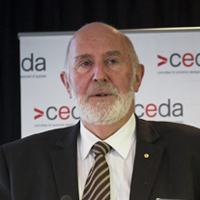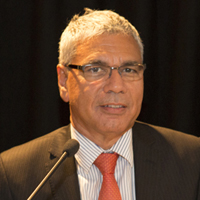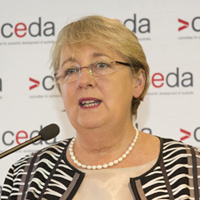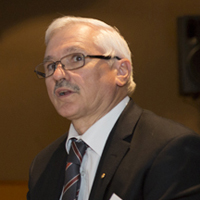PROGRESS 2050: Toward a prosperous future for all Australians
29/04/2013
 |
|
 |
|
 |
|
 |
Programs to encourage employment participation by young Aboriginal people must start with job-specific training but ultimately aim to get more indigenous young people into university, a CEDA forum in Perth has been told.
Beacon Foundation, Founder and Chair and Sinclair Knight Merz, Manager of Indigenous Strategy, Bill Lawson, told the forum that while more than 50 per cent of the population of Aboriginal young people were completing Year 12 or equivalent, many were finishing school with Year 8 level literacy and numeracy skills.
While it was better to have Aboriginal young people finish school than leave early, it was too soon to celebrate, he said.
"If we congratulate ourselves on that achievement too much we delude ourselves - there's work to be done," he said.
"The bar has to be lifted and we have to now build on that increasing retention with increasing literacy and numeracy.
"But the big game is university education - the real decisions are made around the table by people with university education.
"There are a few people who sneak through without university - and good on them - but most people in those positions have tertiary education."
Beacon Foundation, which aims to encourage young people to avoid welfare dependence, had switched its focus from university scholarships to TAFE scholarships, broadening the pool of eligible Aboriginal young people, "to get them in the game", Mr Lawson said.
Chair of GenerationOne, Warren Mundine said new partnerships between government, industry and Aboriginal people shifted the focus to demand-led training rather than training for training's sake. This process identified and trained people for particular jobs, he said.
But Mr Mundine said we must "expect our indigenous students to go onto further education, training and work".
"Students must be graduating with the capacity and skills to go onto further study or real jobs," he said.
"We must stop putting the emphasis on underachievement - where the general population are striving in the area of getting 99.6 per cent marks in HSC or better, this is what we must be expecting and driving for in Indigenous students as well.
"Life and work outcomes will be greatly improved when our young people are able to leave school with the skills they need to prepare them for life and work.
"We can argue that school isn't for everyone, and that may be true, but the reality is that 70 per cent of new jobs created in the next five years will require a Certificate III qualification as a minimum.
"Without a sound education, without the capacity to function in a real economy we will continue to fail to close the gap."
Federal Minister for Families, Community Services and Indigenous Affairs, the Hon Jenny Macklin, said that in the five years since the Closing the Gap program began, there had been a significant shift in Aboriginal expectations about work.
Increasingly, Indigenous people in remote areas expected to find employment and economic development opportunities, she said.
A key part of the program had been to introduce employment agencies in remote areas to help Aboriginal people find employment rather than rely on welfare, she said.
"One of the most exciting changes in my six years as Minister is that Aboriginal people's expectations of government are now that we will foster the conditions for good jobs and economic independence," she said.
"Aboriginal people's expectations of themselves - achieving economic independence - this hasn't always been the case.
"The welfare paradigm that was built up in the 1960s and 1970s did affect the expectations that people had of themselves and of government.
"I do think we need to be honest about the effect of welfare without expectations - it did not create the incentive to work."
Deputy Director General of the Western Australian Department of Indigenous Affairs, Duncan Ord warned there was a "red light" over Aboriginal employment participation in WA.
The structural transformation of the economy since the 1970s had a devastating impact on the jobs previously occupied by Aboriginal people on farms, as stockmen and labourers in local government.
Fly-in-fly-out work had proved popular with Aboriginal people in the southwest of the state but had been denied to people in the remote areas.
Mr Ord said if we cannot address youth and adult unemployment we will not achieve our targets.
"We need to address mobility and barriers to entry of sectors where Aboriginal people are underrepresented, along with economic development and diversification strategies," he said.
